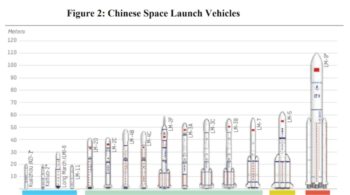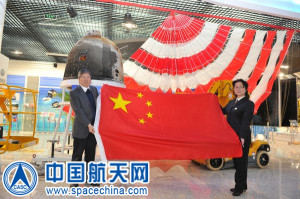
Credit:China Central Television (CCTV)/China National Space Administration (CNSA)/Inside Outer Space screengrab
A new report — China’s Space and Counterspace Capabilities and Activities – offers examines China’s military and civil space programs, including the role of military-civil fusion and international cooperation in the development of its space program.
The just-issued 115-page report was prepared for the U.S.-China Economic and Security Review Commission by the Project 2049 Institute and Pointe Bello.
“Buoyed by recent successes and impressive advancements in space technology, China has emerged as a leading player in space. The implications for United States policy are numerous, and the capabilities China either currently possesses or is in the process of developing certainly pose a strategic risk to the United States’ ability to operate in the Indo-Pacific region,” stresses the report.
Messages to U.S. Congress
Among the report’s recommendations:
— Congress should enact new or enhance existing laws to prohibit U.S. government departments and agencies, national labs, universities, companies, fund managers, and individual investors from supporting China’s space program and activities that are inherently military in nature.
— Congress should consider mandating and funding the production of a routinely updated, publicly available list of entities supporting China’s space programs and activities.
— Congress should consider mandating and funding public education to enhance general knowledge of China’s space programs and activities, including more targeted congressional hearings and the allocation of grants for think tank and university research programs, public conferences, public-private consultative talks, and media outreach.
— Congress should consider reviewing the budgets of NASA and the United States’ leading aerospace university programs to ensure they have the education funding necessary to support young and emerging scientists and technology innovators.
— Congress should consider how funding the establishment of a potential new U.S. Space Force may better enable the military to organize, train, and equip future leaders needed to keep the United States competitive with China’s growing military space enterprise.
— Congress should pass legislation that incentivizes science, technology, engineering, and mathematics-focused high-skilled labor immigration from China (as well as other countries), including special visas earmarked for these students and a public-private effort to find them work.
Long-term strategy
“The Chinese Communist Party (CCP) is executing a long-term strategy to exploit U.S. technology, talent, and capital to build up its military space and counterspace programs and advance its strategic interests at the expense of the United States,” the report explains. “China’s zero-sum pursuit of space superiority harms U.S. economic competitiveness, weakens U.S. military advantages, and undermines strategic stability. In short, it represents a threat to U.S. national security.”
Barring significant action to counter China’s space-related programs and activities of concern, the report concludes, “it is likely that this strategic competitor’s efforts will continue to adversely affect U.S. interests.”
Lunar exploration
The report notes that in 2013, China became the first space power to land on the Moon since the Soviet Union’s mission in 1976. “China’s various motivations include mining of helium-3 as a replacement for fossil fuels and solarpower.”
However, the direct benefits to the People’s Liberation Army (PLA) of the lunar exploration program, including activities on the farside
of the Moon, are unclear, the report adds. “As part of its lunar exploration program, China has demonstrated critical military capabilities in space, such as proximity operations and loitering.”
Ongoing assessment
Note: This report was prepared at the request of the U.S.-China Economic and Security Review Commission to support its deliberations. Posting of the report to the Commission’s website is intended to promote greater public understanding of the issues addressed by the Commission in its ongoing assessment of U.S.-China economic relations and their implications for U.S. security, as mandated by Public Law 110-161 and Public Law 113-291. However, it does not necessarily imply an endorsement by the Commission or any individual Commissioner of the views of conclusions expressed in this commissioned research report.
To read the full report — China’s Space and Counterspace Capabilities and Activities – go to:
https://www.uscc.gov/sites/default/files/2020-05/China_Space_and_Counterspace_Activities.pdf




